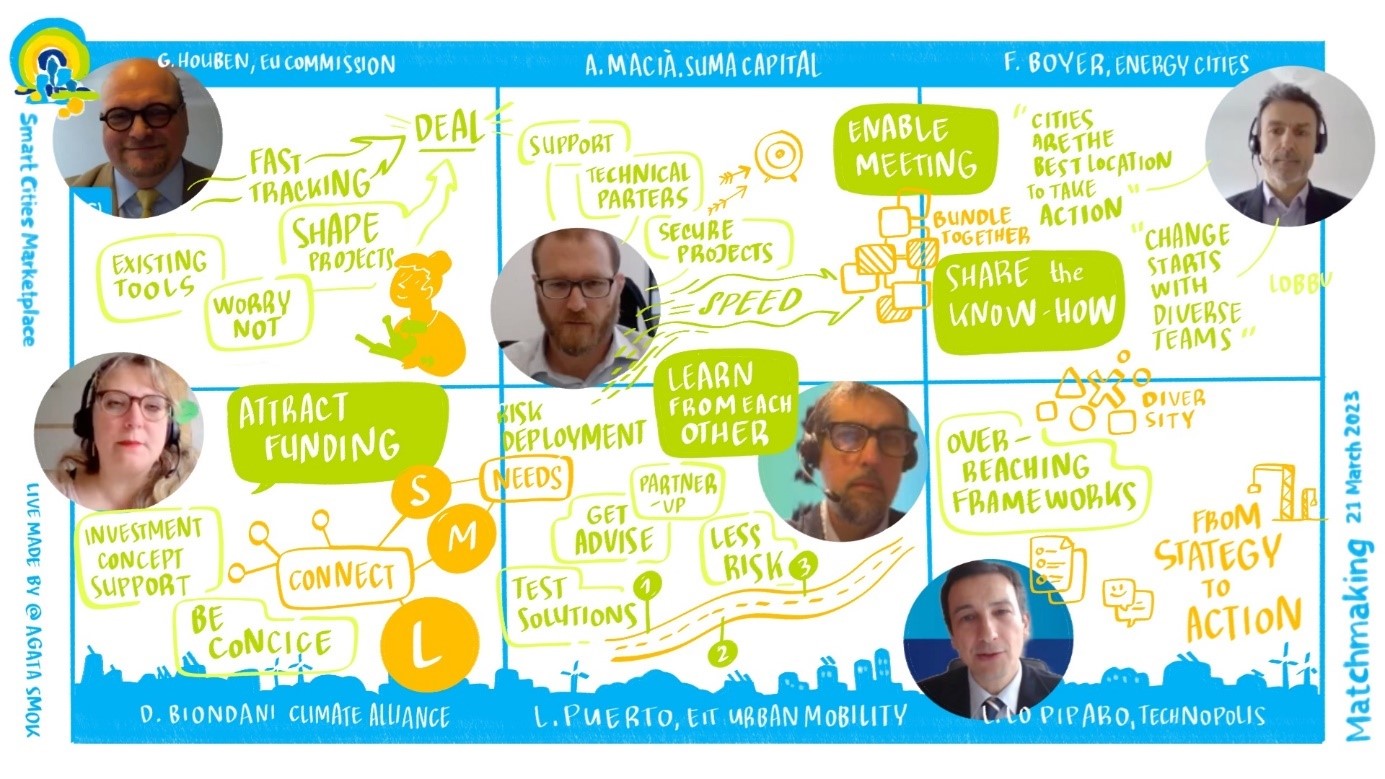Plenary Session: How to join and cooperate within the Investor Network
Session speaker:
Georg Houben, European Commission, DG ENER
Antoni Macià, Suma Capital (member of Smart Cities Marketplace Investor Network)
Frédéric Boyer, Energy Cities, Covenant of Mayor
Dora Biondani, Climate Alliance, European City Facility (EUCF)
Lluis Puerto, EIT Urban Mobility
Moderator: Luigi Lo Piparo, Technopolis Group, Smart Cities Marketplace, Matchmaking Coordinator
Find the recording here.
A panel discussion among representatives from Smart Cities Marketplace, Covenant of Mayors, European Cities Facility, EIT Urban Mobility and Suma Capital.on their collective offer to support smart projects in becoming bankable and access relevant funding and financing for accelerating the transition towards climate neutrality.
According to a recent survey (source: Net Zero Cities Expression of interest from candidate cities), 68% of cities identified lack of funding/financing schemes as the biggest barrier to pursuing climate neutrality. This barrier is due to several factors: high initial investment costs, regulatory and governance barriers, and lack of know-how and expertise on climate finance and climate investments. How is your initiative supporting cities in addressing this barrier?

Discussion about how the lack of private sector engagement is another element hindering the transition towards climate neutrality. What do the initiatives in the panel do to address this challenge?
- European City Facilities provides contact to investors and helps develop an investment concept and assists in capacity building;
- EIT Urban Mobility is an interface between cities and the mobility sector, the mission is to accelerate the mobility transition;
- Investors working through technical partners have more success in backing technical partners and the challenge of developing projects with city administrations. Importance for the city to have an overarching plan i.e., a strategy to move forward in the energy transition;
- Covenant of Mayors with a focus on climate neutrality and adaptation, cities play a vital role in engaging with citizens. EU national funding programmes are not reaching the cities another challenge is the capacity of cities to deal with the various crisis, and to go and make a bankable project. The need for cities to drive the Renovation Wave. Implementing action needs a huge investment and needs to work with other initiatives like the Smart Cities Marketplace.
Discussion about the need for a structured framework to assess funding alternatives and for different financing options, how is your initiative responding to this challenge, notably for facilitating the aggregation of demand from small and medium-sized cities?
- Calls for grants from the European City Facility to address small and mid-size cities, and efforts to learn from each another;
- The opportunity to aggregate demand from smaller cities and learn from the front-runners is important as the piloting of solutions. Another option is to aggregate demand for potential investment;
- Size matters – the aggregation of demand through various municipalities through ESCOs as an example in smart lighting. When tenders are big enough then investors are interested.
Discussion about the need for innovative approaches and the aggregation of demand, lack of knowledge and the innovators’ need to learn how to work with cities.
- Need to team up with other initiatives and networks of cities, trying to also go more national with regional actors. The regional approach can be most efficient for example by using regional and cohesion funds;
- Aspects of small and mid-size enterprises are important to be included in the approach when it comes to climate neutrality in cities in some cases, they initiate the process (mention of Covenant of Companies);
- The Smart Cities Marketplace provides cities and consortia with vital knowledge and support in moving their smart city ambitions forward. On the Smart Cities Marketplace’s website, there are use cases from more than 90 successful European projects, including 18 Lighthouse projects, solutions implemented in both small and medium-sized towns and in metropolises such as London, Barcelona and Vienna. Many projects have reported their core data into the Smart Cities Marketplace Self-Reporting Tool, to be picked up and developed into bankable solutions;
- It is not about the number of cities, but the quality of the investment and the size of the investment needed;
- Aggregation can also be a bundle of activities, there is flexibility in terms of the time frame and measures implemented.
